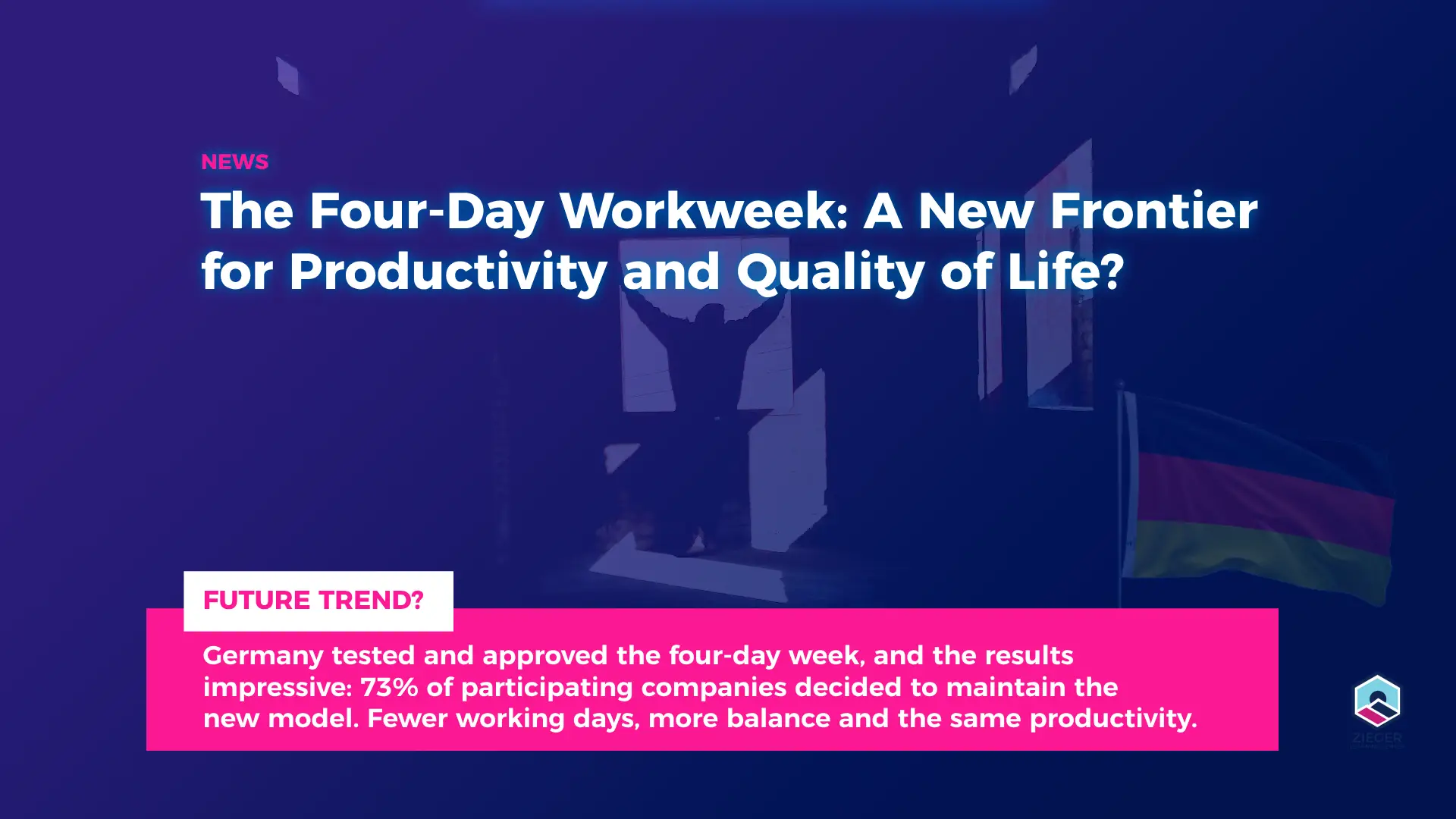The Four-Day Workweek: A New Frontier for Productivity and Quality of Life?

Introduction
In the global work landscape, issues such as productivity, innovation, and employee well-being have taken center stage. Companies and professionals alike are increasingly looking for models that not only deliver results but also support workers’ quality of life. Faced with long hours, rigid schedules, and growing demands, many professionals experience high levels of stress and burnout—a reality that doesn’t always translate into higher productivity.
Worldwide, countries and companies are rethinking the efficiency of the traditional five-day workweek. Among these initiatives, Germany’s recent experiment with a four-day workweek stands out for its promising results. This model, which involves reducing the workweek by one day without cutting pay, has been hailed as both innovative and sustainable. But can it truly deliver tangible benefits for both businesses and their employees? And, more critically, how might this idea work in very different contexts, such as that of Brazil?
The German Case: Experiment and Results
In February 2024, 45 German companies embarked on a six-month trial of the four-day workweek in collaboration with the consultancy Intraprenör, 4 Day Week Global, and the University of Münster. The project followed the 100-80-100 model, which provides 100% of pay for 80% of work time, with the expectation of maintaining 100% productivity. The participant group included a mix of small technology firms and larger companies like SAP, which tested the reduced workweek with pilot teams to measure its impact
The results were noteworthy:
- Productivity and Well-being: Around 73% of companies decided to continue the four-day week or extend the experiment, reporting stable (and, in some cases, increased) productivity. Employees reported lower stress levels and improvements in work-life balance, with fewer sick days requiredThe HR DigestGulfNews.
- Talent Attraction: In a market where talent retention is an increasing challenge, especially as Germany anticipates a labor shortage of around 7 million workers by 2035, the four-day model proved to be an appealing differentiator. Companies saw an increase in job applications and greater employee satisfactionThe HR DigestDeutsche Welle.
- Work Innovations: To adapt to the shorter week, many companies invested in task automation, meeting optimization, and flexible roles. These changes helped maintain efficiency, demonstrating that technological innovation is an essential ally in sustaining the model across various industries4 Day Work Week.
Reflection: How Far Can This Model Go?
The results of Germany’s trial reinforce a growing trend: the pursuit of shorter workweeks that either maintain or even increase productivity. This initiative also echoes recent four-day workweek pilots in the UK and Portugal, where companies observed similar gains in well-being and engagement.
Naturally, one might ask: could this model realistically be replicated in Brazil or other developing countries? While Brazil has seen ongoing progress in terms of work innovation, its economic context and market realities may complicate a similar transition. Companies in emerging markets face distinct structural and economic challenges, requiring careful planning and adaptation to implement any transformative model. For example, reducing the number of workdays must be balanced against the productivity needed to remain competitive.
Nevertheless, the innovations emerging from these trials can serve as inspiration. Brazilian companies, and those in other developing economies, can look at adopting practices such as process automation and flexible roles to optimize work. In doing so, they may even take steps toward a more balanced, human-centric approach to work.
Conclusion
Germany’s experience with the four-day workweek raises fundamental questions about the future of work and the role companies play in employee well-being. In a global landscape where quality of life and productivity are seen as complementary forces, exploring more flexible work models may be a strategy to attract and retain talent while securing sustainable results. We now look forward to seeing how this trend will unfold and whether, in different forms and at different paces, it might inspire companies worldwide—including in Brazil—to adopt more balanced and innovative practices.
Glossary
- Four-Day Workweek: A work model where the standard weekly hours are reduced to four days, with no reduction in salary.
- 100-80-100 Model: A structure that provides 100% of pay for 80% of the work time, with the expectation of maintaining 100% productivity.
- Process Automation: The use of technology to carry out repetitive tasks, freeing up employees for more strategic activities.
- Meeting Optimization: The reduction and restructuring of meetings to improve workflow and reduce interruptions.
- Intraprenör: A German consultancy that coordinated the four-day workweek trial in Germany.
References

